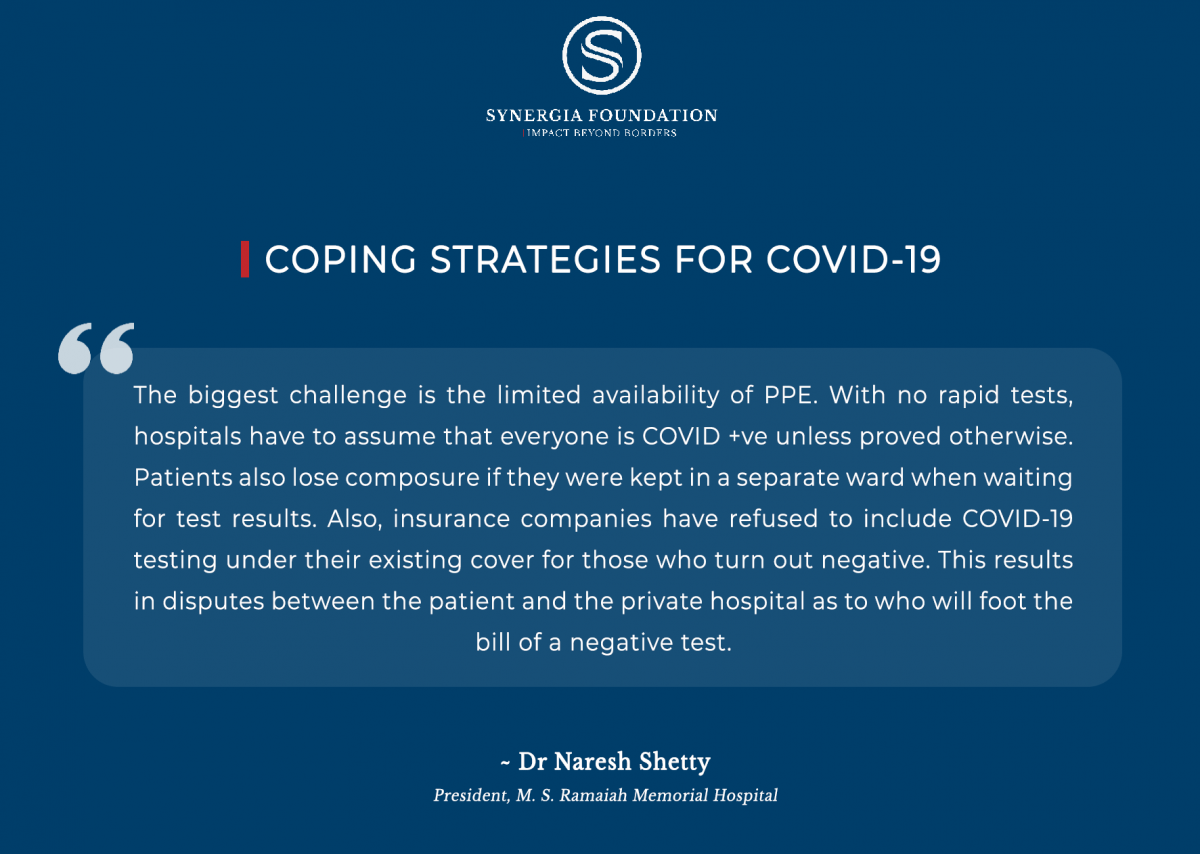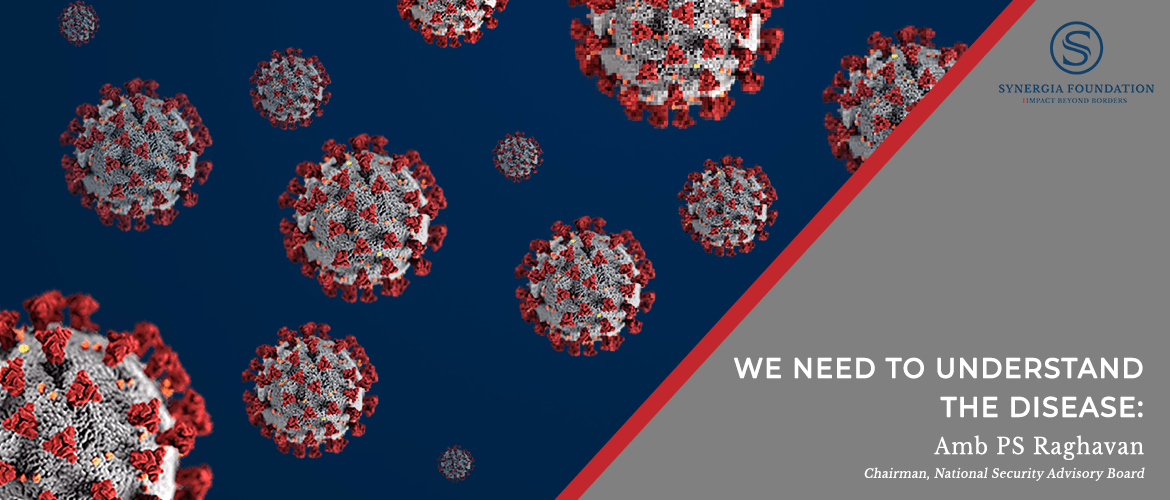We need to understand the disease: Amb P S Raghavan
April 27, 2020 | Expert Insights
The lack of our understanding of the contagion is a serious limitation to our ability to find a credible strategy to combat the pandemic remarked Amb PS Raghavan, Chairman National Security Advisory Board (NSAB). He stressed on this fact at webinar conducted by Synergia Foundation to fathom the threat posed by COVID-19. The expert panel comprised of Ambassador PS Raghavan, Chairman National Security Advisory Board, Dr Devi Shetty, Chairman Narayana Health Care, Dr Arvind Kasturi, Head Community Health Care, St Johns National Academy, Dr Rajesh Sundareshan ,IISc, Dr Mukund Thattai, NCBS -TIFR, Dr Alex Thomas, President AHPI, Dr C N Manjunath, Director Srijayadeva Institute of Cardiology, Dr.Naresh Shetty, President, M. S. Ramaiah Memorial Hospital, R Balasubramanian (Harvard School of Public Health), Maj Gen Moni Chandi ( Synergia ), Maj Gen Ajay Sah ( Synergia) and Sambratha Shetty ( Synergia).
Speaking of the post lockdown strategy, Amb Raghavan pointed out that the focus must be on testing including anti body testing, stringent implementation at the local level. He lamented the lack of popularity of the Aarogya Setup app which would help in generating useful data to track and trace the infection and supplement other containment measures, if widely used. Looking at the future scenario, he flagged the need for a responsive health care system which would be designed to tackle pandemics with a specific role for National Disaster Management Agency and the Public Health Foundation of India to promote public private partnership in this endeavour.
This is not the time for “them and us” said Mr Satyajit Mohanty, IRS, Joint Secretary NSAB proposing a well-integrated strategy based upon 3Cs-Convergence of policies between government, local administration, hospitals, Proper Communication strategies and Coordination. While public health care hospitals are best placed to deal with the crisis we are facing now, the private sector too has a role. He recommended a graded approach to patient care to avoid overwhelming of our hospitals so that only the most deserving cases reach the COVID hospitals. As regards the supply chain for PPE, he said that it should be robust and meet the requirements where needed. On a wider perspective, he advocates India reaching out to its neighbours during these trying times leveraging its larger resources and expertise
The role being played by the private sector health care system, despite numerous challenges was amply described by Dr Devi Shetty, Chairman Narayana Health Care. He called for a coordinated approach to the epidemic by integrating the strengths of both public and private health care systems. While praising the role being played by the public health care, he sought to draw attention of the government on the shortcomings of the private hospitals especially in terms of inadequate availability of PPE. Yet these private hospitals continue to serve scores of patients who throng to these hospitals, at grave risk to themselves, as they have confidence on the private hospital system.
The anatomy of the disease was well explained by this highly qualified panel and coping strategies defined. Dr Arvind Kasturi, Head Community Heath Care St Johns National Academy while calling it a fast spreader noted that in about 90% cases, it only causes mild illness which do not require hospital care and can be cured at home, with remote medical supervision. He gave a graphic picture of the rural health care challenges, especially with regard to dependence upon local level care including ASHA workers and PHC. “It is here where the battle needs to be fought and won,” he emphasised. He gave a broad picture of available health infrastructure in Karnataka with about 16000 beds available in Bangalore. These figures are rising as more COVID hospitals are being created from existing resources. Still the capacity is low and inadequate to meet a spike.
In the absence of statistics related to COVID 19, being a totally new phenomenon, simulation models to predict the trajectory of the disease is difficult. Dr Rajesh Sundareshan, IISc who has been working on simulators for COVID 19 in consultation with foreign universities, described how simulation models could help decision-makers to evolve strategies. Agent-based models can create synthetic cities and the various demographics in these synthetic cities to carry out scenario play. By factoring varied population sizes and types, living conditions, rates of infections and hospital capacities simulation can give us an idea of morbidity/ mortality rates. After this, a variety of interventions can be applied to see how these will mitigate the morbidity/ mortality rates. Responding to a question pertaining to group testing and local strategies, he commented that group testing could be done in some districts where infection level is zero, and then we could open up those areas. After removing the lock down from these districts, testing has to be repeated to see if a second wave is coming which would call for imposition of the lockdown.
For better efficacy, simulator model should cover the smallest possible scale, that is, at the local level, proposed Dr Mukund Thattai, NCBS -TIFR. The results will be easier to re-calibrate at a larger scale. It is difficult to make policies on country-level models because they are uncertain. Evolving a model for COVID-19 is proving to be extremely difficult as it is not behaving like an earlier virus, especially the way it has created symptomatic "super-spreaders" who have single-handedly infected thousands over a few days. Super spreaders can only be contained through a specific kind of containment strategy or
There is a growing concern by economists that the lockdown is wrecking the economy and this is a bigger threat. Dr Alex Thomas, President AHPI asked for a balanced approach in any strategy which could deal with challenges both of health and economic in nature. He advocated greater use of remote medical care to reduce the burden on hospitals as tertiary care cannot be put on hold for too long.Since non Covid hospitals have been identified, the treatment of other diseases should also commence, of course with adequate precautions. Towards this end, PPE is equally important for non COVID health workers too. He too highlighted the stark difference between preparedness to face the COVID 19 threat between public hospitals and private ones, which has to be addressed by the Government. He felt that the pandemic has shown that India needs far more health workers and hence there should be a more liberalised medical education system.
R Balasubramanium also emphasised on the rural scene where it is difficulty in enforcing social distancing; harvesting, planting and other agri activities are community events. Lack of water and makes hand washing difficult. Doctors coming into the villages do not have PPE. Social stigma of the disease is also a big issue in rural communities.
Describing the intricacies of running a COVID hospital at the frontline against the pandemic, Dr.Naresh Shetty, President, M. S. Ramaiah Memorial Hospital explained how it is critical to establish several layers of filters even before the patient is admitted. The hospital has a fever clinic outside where blood test and X-rays can be done. He said that they were trying to design a rapid test kit so that the identification process is expedited.

Providing insights on Karnataka, Dr Prakash said that the state has been proactive on many fronts but has not been able to educate people about social distancing properly. He said that the media should educate people about social distancing and hand hygiene. According to him, Ozone therapy has been helping immensely in China, Italy, Spain, etc.It is necessary to keep an open mind while thinking about therapies and focus on living healthy. He said that we could explore what works in homoeopathy.
Maj Gen Ajay Sah said that general perception is that India is ahead of the curve, but there are no facts to substantiate it. There are no reports of testing and tracing. He put to question about the level in which India will be able to sustain medically and at what point the medical systems will get overwhelmed? He stated that so far, there is no such simulation or statistic. If there is a second wave, do we have a reserve to handle it? Are we looking at the strategic sharing of PPE and other resources? Do we need to think of strategic transportation ability for our medical resources?
According to Sambratha Shetty, the focus has to be on how to build testing kits in-house in Karnataka, and our state-wise capabilities. As an interim measure we may use imported kits, but since this pandemic is going to last, we must quickly indigenise.
Maj Gen Moni Chandi (Retd) was of the opinion that not much is known about COVID, and hence it cannot be easily defeated. He said that there are lots of similarities between terrorism and COVID. Both, the terrorist and the virus, hide in crowds, affect the weak most and work to divide societies.



Comments